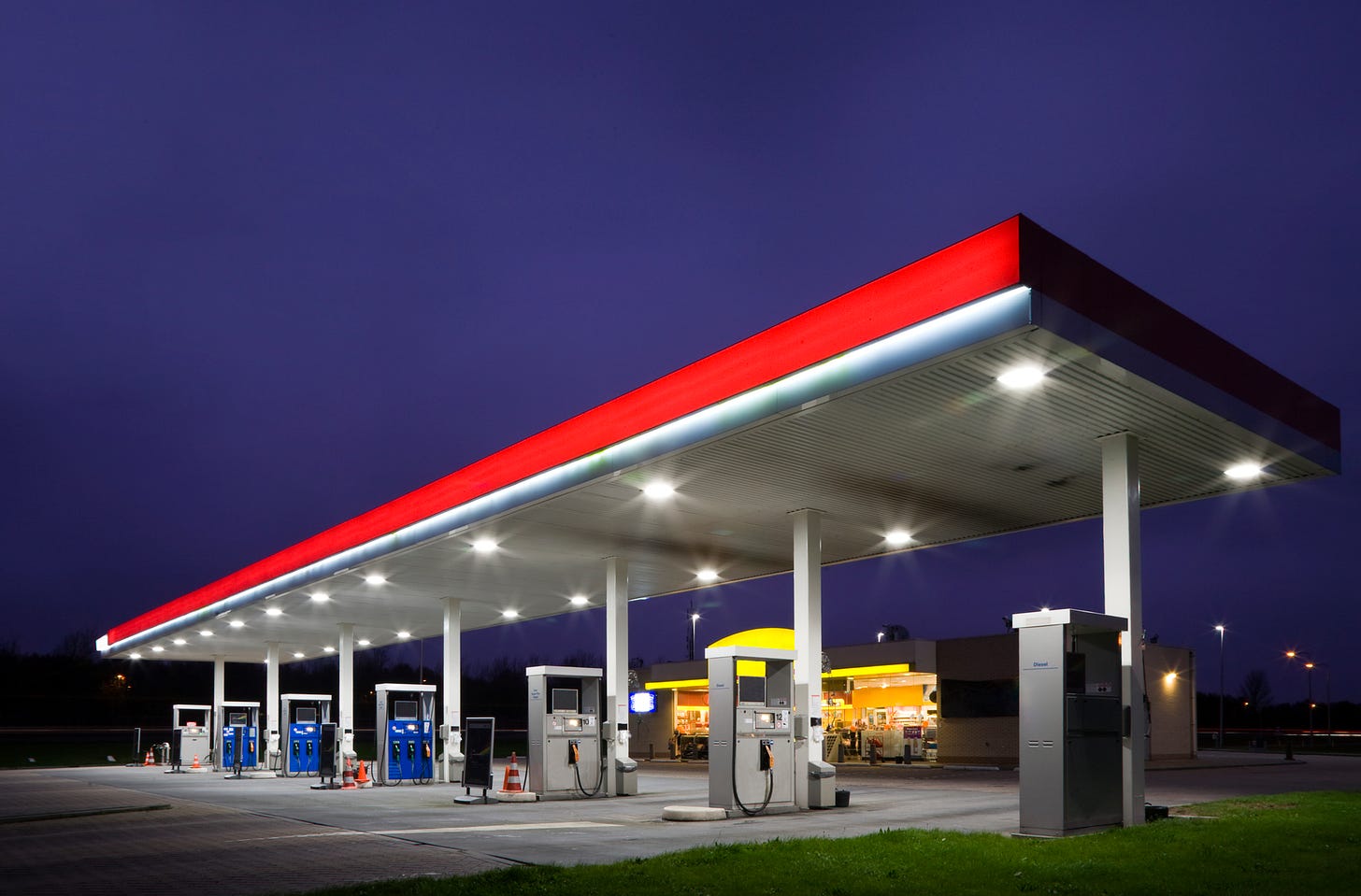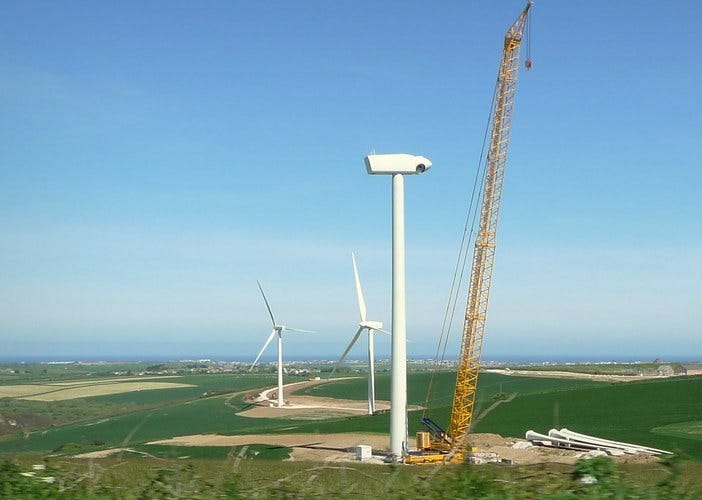John Wolthuis recently tweeted an interesting question:
One of the things I've struggled with is whether it's more important to reduce the supply of fossil fuels or to reduce the demand for them.
“Reducing supply” might mean lobbying against new pipelines, filing lawsuits to block drilling permits, etc.
“Reducing demand” is broad: electrifying vehicles, replacing gas furnaces with electric heat pumps, building more solar and wind farms, conservation... anything that replaces or reduces some application of fossil fuels.
Should we focus on one, the other, or both?
If We Lower Demand, Good Things Happen
As electrification and renewable electricity sources scale up, hopefully, we should soon reach the point where demand for fossil fuels begins to decline. Basic economics tells us that the price will then fall, in turn causing the highest-cost producers to drop out of the market. In other words, as demand shrinks, supply will shrink to match.
We see this play out all the time. When the price of oil falls, high-cost sources (e.g. fracking, tar sands) are no longer viable, and the pumps stop operating. US coal production has been in fairly steady decline since 2008. Global fossil fuel consumption continues to increase overall, but sometimes it dips, and prices and production then drop as well.
(Note that distribution infrastructure doesn’t scale so easily. If 50% of households stop using natural gas, the utility still needs to maintain distribution down every street. This will strain the utility rate structure, and risks imposing huge costs on the customers who are last to electrify. That could be good from a climate perspective – there will be a huge incentive to finish phasing out natural gas – but will heavily impact low-income households who aren’t in a position to install new appliances.)
This demand-falls-first scenario brings all sorts of benefits. Fuel prices decline, which is good for the economy, and may make it easier to fund green projects. Fossil producers lose influence. The prospect of coal mines and oil wells shutting down will make the whole industry start to look like, ahem, a dinosaur – thus promoting a helpful air of inevitability around the green transition.
There is one drawback to this demand-based approach. Low fossil fuel prices impose a headwind on decarbonization: when gasoline is cheap, electric cars are less enticing, and so forth. However, by the time we reach the point where fossil fuel demand is falling globally, the key green technologies will really be hitting their stride. We’ll be able to push through a headwind.
If We Lower Supply First, Bad Things Happen
If the supply of fossil fuels is constricted, prices will rise. We just got a fresh reminder of this, courtesy of Russia’s invasion of Ukraine. Russia produces just 11% of the world’s oil, and the threat of that fraction being partially disrupted threw markets for a loop. Economics being a two-way street, this will tend to reduce demand; but not very much. People still need to get to work, factories still need to operate. As things settle down, most of the gap is usually addressed through replacement supply: more fracking, fewer coal mines closing. Some of the replacement supply might be less efficient, or impose greater transportation costs – the oil that would have passed through the Keystone XL pipeline might now be shipped by train. This might actually increase emissions; trains use more fuel than pumps. So artificially constraining fossil fuel supply may not do a whole lot of good.
In technical terms, I am suggesting that for fossil fuels, supply is more elastic than demand. Hence, a restriction in supply will cause new supply to pop up elsewhere, but a restriction in demand does not induce replacement demand.
Of course, it takes time for suppliers to react to price changes. In the meantime, prices spike, the economy suffers, and the clean power movement loses credibility. Energy shortages make people anxious, and anxious people resist change.
Another effect of limited supply is that fossil producers gain importance and power. Remember that the primary purpose of OPEC is to manage production of fossil fuels, and excessive production is a frequent source of internal strife. Restricting supply would make you popular at an OPEC meeting, and any policy that does that deserves careful scrutiny.
We Need To Reduce Demand Anyway
Reducing demand for fossil fuels mostly entails rolling out carbon-free technologies: electric cars, wind farms, heat pumps, and so forth. We absolutely need to be doing this, as hard as we can, at grand scale, all over the world.
Happily, this is exactly the sort of transition that benefits from the flywheel effect: the more we do, the easier it gets. Learning curves, economies of scale, and increasing comfort levels all smooth the path toward greater and greater adoption.
Artificially reducing supply, on the other hand, would suffer from an opposite effect: each time we close a pipeline, we push prices up and create supply anxiety, making it that much harder to close the next pipeline.
Imagine a world where we are wildly successful at reducing demand for fossil fuels, but we don’t manage to do anything about supply. This is a good outcome: with no demand, supply will wither. Now imagine the reverse, where we somehow manage to eliminate oil wells, without doing anything about demand. That’s the actual plot of a dystopian novel.
We Need To Encourage Construction, Not Block It
As we all know, decarbonizing the world’s economy is going to require massive manufacturing and construction projects. We need to make it easier to build things. As Ezra Klein recently noted, the very environmental laws and regulations that have been useful in blocking fossil fuel projects are often being misused to hobble decarbonization projects as well – for instance, allowing rich coastal landowners to block wind farms in service of their seashore views.
Blocking the Keystone XL pipeline was a nice win (probably; see earlier discussion of pipelines vs. trains), but does nothing to eliminate the massive existing fossil fuel infrastructure. The best way to shut down existing facilities is to make them uneconomical – by making it easier to build green energy projects, not harder to pump oil. Maybe we could do both, but that’s a tricky needle to thread.
If we are as successful as we absolutely need to be at producing clean energy, there won’t be any need to reduce the supply of fossil fuels; the market will take care of it. Our best tool is innovation, and innovation can reduce demand for fossil fuels, but can’t reduce supply. So let’s get out there and build!
Thanks to Erika Reinhardt for feedback on an early draft of this post.






"Build it and they will come" is not something energy suppliers are going to want to take a risk on if they can be undercut by cheaper alternatives.
For example, natural gas suppliers build up their supplies in the summer for the following winter. They will buy less if they are worried about bring undercut by cheap alternatives, resulting in selling at a loss.. In Europe, the cheap alternative to worry about is Russian gas. Will the war be over by then? Uncertainty about this will reduce investment in alternative supply.
Similarly, demand for more fuel efficient cars depends on what consumers expect gas prices to do. There was a big, sudden shift to fuel efficient vehicles in 2008 due to higher gas prices that helped drive some car companies to bankruptcy. Car companies base their investments on what they think consumers will want years from now, and guessing wrong is bad.
Prices matter and it can take months or years for both buyers and sellers to adjust. High prices *now* are painful and don't accomplish as much for infrastructure building as perceptions about what prices will be in coming years.
Governments could set a floor on future prices using commitments to future tariffs on Russian oil and gas.
I've been enjoying reading your thoughts – thanks for putting them down! One of the things I think about a lot on the supply side is the impact that building new fossil fuel infrastructure to meet even existing supply will have on future demand. The crux of it is I think in this statement -- "The best way to shut down existing facilities is to make them uneconomical – by making it easier to build green energy projects" -- and how much new, soon-to-be-uneconomical fossil fuel infrastructure will incentivize companies who built that infrastructure to fight against, e.g., making green energy projects easier to build.
For instance: Enbridge spent over $9B on a pipeline that just opened, and I would guess they'll be fighting like hell for decades against policies that would make it harder to recoup that cost, including, likely, policies that incentivize a reduction in demand -- by building competing energy projects or otherwise. The way supply impacts policies that shape demand means that stopping new fossil fuel infrastructure can impact both sides of that equation.